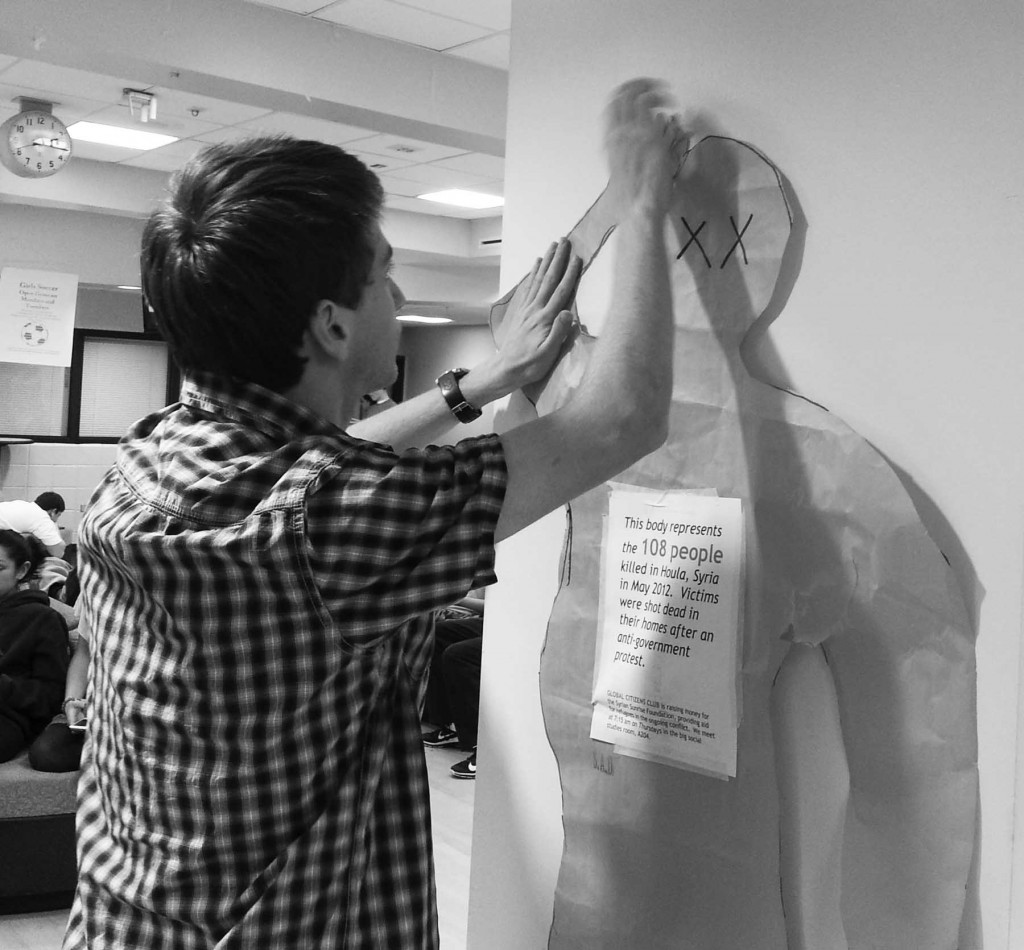
As senior Nour Abdelmonem updated the Syrian death toll on the Global Citizens Club bulletin board in the SA Hall, she said that a passing student asked her for reassurance that the increase in numbers was a “good thing.”
The death toll represents a growing number of casualties in the Syrian civil war rather than suggesting some form of progress. Startled by the evident ignorance about current events, Abdelmonem, co-president of GCC, said she wanted the club to educate people about the Syrian conflict. She feels that while people generally might have an idea that something is going on, “People don’t understand what a death toll means and how bad the conflict actually is.”
The current civil war in Syria is a conflict between different religious and ethnic groups, according to Josef Olmert, adjunct professor of Middle Eastern Studies at the University of South Carolina. He said that because of the historic developments of the country, Syria consists of many different religious and ethnic communities that are “lumped together” and lack a sense of unified nationality.
He said the regime in the last 40 years has been totally dominated by a sectarian affiliation of Alawites – non-Muslims who make up about 15 percent of the population. This regime has consisted of a brutal military dictatorship that has “always been resisted by the majority Sunni Muslims,” Olmert said.
The military regime has gotten away with mass murders in the past, most notably in Feb. 1982 when 25,000 civilians were massacred, he said. As the regime lacked legitimacy in the minds of many Syrians and as the circumstances in Syria gradually worsened, “everything exploded in March of 2011,” Olmert said.
“Most of the population is fighting against the regime, but there is also fighting between civilians,” said Olmert. “There are two levels of violence. One between the military, which is basically Alawite, and the rebels, who are mostly Sunnis, but there is also local crisis all over the place, including fighting between neighborhoods in mixed areas.”
When Abdelmonem attended a Chicago Council on Global Affairs presentation, a speaker on Syria noted that the country is much more complicated to deal with than other nations experiencing the Arab spring.
“It’s sad what’s happening there in general, politically, but I think there are so many side-effects of the conflict in general, too,” said Abdelmonem. “Those are things that we can address like orphans, and widows and families that are living in the UN tents but aren’t getting enough food. I think, yeah, the conflict is bigger than us, but you can take little parts of it and make it more personal.”
A Syrian friend of Abdelmonem told her about the Syrian Sunrise Foundation, which addresses the needs of orphans, widows and families who usually go to the outskirts of Syria or into neighboring countries. The organization provides food, shelter and other daily necessities to the refugees.
“The people who have been displaced no longer have their homes [and] have to restart their life either temporarily or forever,” said Abdelmonem. “Who knows how long this will last?”
When Abdelmonem suggested the cause of helping Syrian refugees for the GCC, co-president Matthew Bondy was eager to get involved.
GCC members put up paper body cutouts on hallway walls with statistics about the conflict in order to raise awareness. Abdelmonem and Bondy both hope the posters serve a wake up call to students. Along with keeping the student body informed with the death toll and with the facts on the body outlines, GCC is organizing a documentary showing to profit the Syrian Sunrise Foundation on April 18 with STAND, its sister club at Glenbrook South. The documentary should inform viewers about the current crisis.
The club is also scheduling a Color Run on May 25 to raise money for the organization. A Color Run is a five-kilometer race in which participants are splattered with paint throughout the duration of their run. In the meantime, money from pizza and Blow Pop sales, along with fundraisers in the Student Center, are set to benefit the Syrian Sunrise Foundation.
Abdelmonem hopes that the reactions of the student body to GCC’s work will include interest in what students can do to help. She and Bondy recommend regularly checking up on the news to stay informed.
“Even learning about [the conflict] is a small way of helping,” said Abdelmonem. “At least you’re recognizing the problem.”
Olmert recommended teaching others and contacting local politicians to be proactive in helping the situation.
“Hopefully [students will] get as alarmed about [the conflict] as I am,” said Abdelmonem. “We take so many things for granted, we need to pop the Northbrook bubble sometimes and get outside.”


